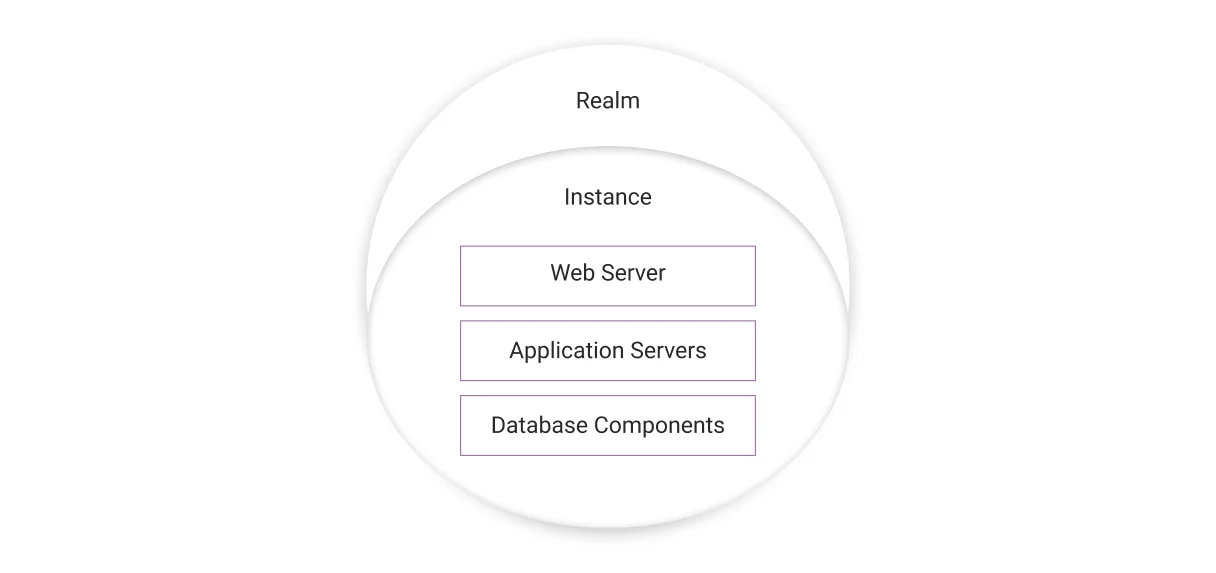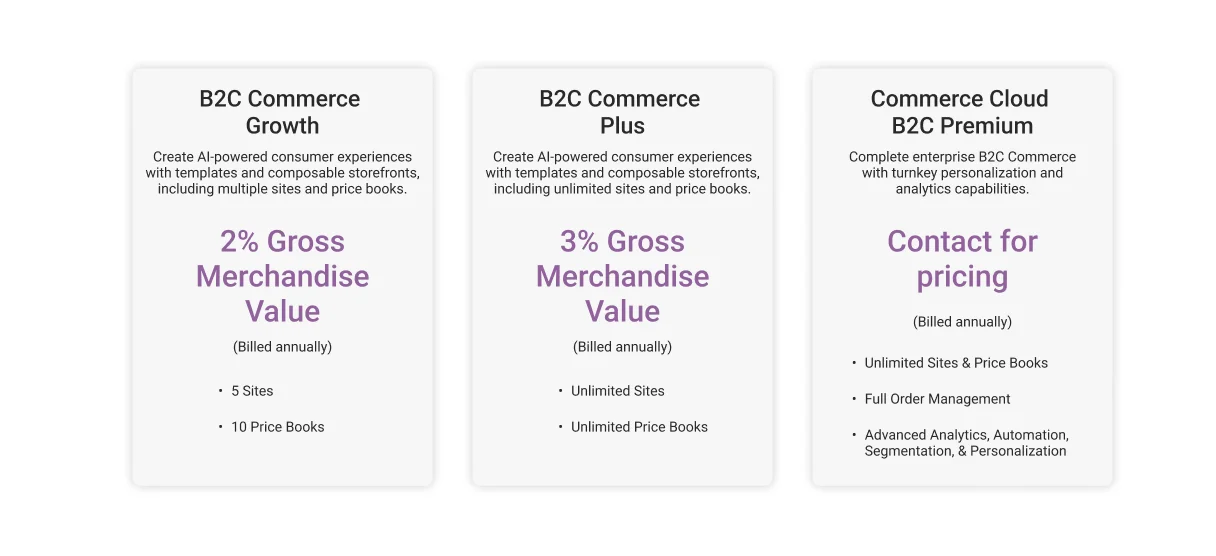Salesforce
ServiceNow
Table of Contents
Salesforce B2C Commerce Cloud is a cloud-based e-commerce platform designed for retailers and businesses that directly deal with their customers. It is part of the Commerce Cloud solution suite, which also includes B2B and D2C Commerce Cloud.
Originally introduced in 2004 as Demandware, it was later acquired by Salesforce for approximately $2.8 million and was renamed ‘Salesforce B2C Commerce Cloud’. It enabled Salesforce to cater to the needs of B2C businesses and offer a complete CRM solution. They could connect their web storefronts natively to Salesforce marketing, sales, and service clouds, manage everything from product catalogs and promotions to customer support and AI-driven personalization with Einstein, all in one place.
Fast-forwarding to 2025, Salesforce B2C Commerce Cloud is serving 11,370+ businesses globally. They are not only utilizing the platform but are also experiencing quantitative benefits. E-commerce businesses that moved from legacy systems to this cloud platform saw a 29% increase in their digital revenue.
At the same time, it helped a variety of users, such as merchandisers, developers, and administrators, by automating workflows 27% faster (Salesforce), highlighting B2C Cloud as the ultimate solution for modern businesses.
Want to know how Salesforce did it? Explore this blog!
Here are the key business challenges that B2C Cloud solves.

Complex or slow checkouts are major friction points for businesses. As per Baymard’s premium research findings, 70% of users abandon their carts due to an inefficient checkout experience. A lengthy and complicated checkout process requiring multiple steps, charging hidden fees, or unfriendly mobile experiences can make the customer abandon their purchase.
B2C Commerce Cloud provides optimized, mobile-first checkout experiences through its variety of features. Let’s see how:
You get pre-built templates that can be tailored to match your brand tone and identity. Plus, you can integrate payment gateways of your choice.
Einstein’s predictive intelligence helps you create upselling opportunities that are similar to what the customer is looking for, removing friction and reducing shopping cart abandonment.
With the latest Payments plugin, B2C Cloud enables an express “Buy Now” experience. It bypasses the full cart while preserving existing cart contents. This one-click flow significantly simplifies the conversion of leads into customers.
Customers can modify items, shipping details, or apply coupons mid-checkout without restarting the process. This prevents losing progress and ultimately reduces friction as well.
The built-in cart-lifetime feature retains cart contents across sessions, both for signed-in and guest users. This makes it easy for shoppers to resume where they left off.
Commerce Cloud integrates with Salesforce Marketing Cloud, enabling automated abandoned-cart email journeys:
Many businesses struggle to manage increased web traffic during busy shopping seasons. This leads to website crashes, lost sales, failed transactions, and slow performance, which ultimately affects the revenue.
B2C Commerce Cloud automatically adjusts its resources as per demand surges to maintain high performance. It increases or decreases the number of application servers and processing power in real time to manage increased traffic.
With layered caching and its seamless management, it minimizes downtime and server strain. This can speed up the processing of data-heavy content in B2C storefronts, such as videos.
It allows you to control response times, traffic patterns, and bot activity to quickly identify and resolve bottlenecks.
Improving how customers perceive a brand and their overall experience is often challenging in this growing competition and economic uncertainty.
A variety of B2C commerce cloud features come together to work on it.
The headless commerce and API-driven architecture allow you to make changes to the front-end and back-end separately. This promotes independent working and eliminates the risk of false deployment. It works for both web and mobile-first experiences, ensuring a consistent, fast shopping experience across web, mobile apps, kiosks, social media, and in-store touchpoints for customers.
It ensures global storefront management through multisite setup, including multi-language and multi-currency support. Therefore, using centralized control, you can scale swiftly across the globe while also delivering localized experiences.
Using Page Designer, your business teams can quickly build and refresh landing pages with banners, carousels, and product sets. This offers richer user experiences.
Businesses need to adapt quickly to changing market conditions, customer preferences and trends, and competitive challenges. According to Talend, 95% of purchases are expected to be made online by the year 2040.
Salesforce B2C Commerce Cloud helps in catering to this challenge better. It utilizes Einstein AI capabilities to the fullest to ensure your business adapts to the changing market trends. It works on personalized recommendations, predictive merchandising, and search optimization.
On the other hand, Agentforce agents assist across different domains, from trend and merchandising analysis, handling routine requests, to booking follow-ups, and much more. It optimizes customer experiences and operational processes, adapting to market behavior with minimal manual intervention.
With omnichannel support and all-over sync, you get a consistent experience across all channels and platforms. With this flexibility, you can enter new markets quickly and deliver culturally adaptive, relevant shopping experiences with ease where your customers are present.
Salesforce Commerce Cloud is the base resource on which all your instances and live sites run. You do not directly interact with it, but it acts as a foundation.

A Realm contains all your commerce instances where you can develop, stage, and deploy multiple sites with different branding ideas and tones.
An instance is a specific environment within a realm that acts as an application infrastructure, comprising components such as web servers, application servers, and databases.
If your business has different teams or locations, consider using multiple realms. You get isolated environments for different business units or geographical regions, yet easy data shareability. This allows each team to manage their sites separately if they have different processes or policies.
Websites within the same realm can share product data with each other. However, websites in different realms cannot share data directly through the catalog. You can still share data by importing it into different realms.
Talking about the instance group, there is a primary instance and a secondary instance group. Let’s understand them.
There are 6 B2C Commerce instances: 3 or more Sandbox instances for code development and 3 different instances for site staging, testing, and deployment.
It contains Sandbox instances for development and testing, where developers can easily modify code without affecting the live environment.
Other points to consider while understanding B2C Commerce Cloud Architecture
Understand how data flows inside the system.
This specifies the particular access as per the roles.
Here are some of the key businesses that have used the platform and seen better results (Source: Salesforce):
It is a world-renowned retailer of innovative outdoor products and a durable range of drinkware.
Challenges
Solution
Results
It is a premium beverage e-commerce leader.
Challenges
Solution
With the capabilities of SFCC (Salesforce Commerce Cloud), they were able to:
Result
Siemens is Europe’s largest industrial manufacturer, with operations in 190 countries.
Challenge
Solution
Result
Here are some of the top challenges that you might face while implementing Salesforce B2C Commerce Cloud.
You need skilled Salesforce experts to address implementation challenges and ensure a smoother setup of B2C Commerce Cloud.
Salesforce B2C Commerce offers various pricing tiers, each tailored to different business needs and scales. Here’s a breakdown of the pricing levels:
| Name | B2C Commerce—Growth | B2C Commerce—Plus | Commerce Cloud B2C Premium |
|---|---|---|---|
| Pricing | 2% of Gross Merchandise Value (GMV), which refers to the total monetary value of all goods sold on a platform or marketplace over a specific period. | 3% of Gross Merchandise Value (GMV). | Contact Salesforce for pricing. |
| Features | – Allows 5 sites and 10 pricebooks. – Offers 1.2 million on-demand Sandbox credits.(Varying amounts of Sandbox credits for testing and development purposes.) |
– Allows unlimited sites and pricebooks. – 2 Million on-demand sandbox credits. |
– Offers unlimited sites and pricebooks. – 2 Million on-demand sandbox credits – Full Order Management – 500K Data Cloud Credits. |

Undoubtedly, Salesforce B2C Commerce Cloud can elevate your business’s e-commerce operations to the next level. From managing customer experiences to streamlining storefront management, everything can be done with utmost efficiency and automation.
However, successfully implementing such a powerful platform requires expertise and the right team. That’s where we come in! Our skilled Salesforce B2C Commerce Cloud developers are here to help businesses leverage the platform capabilities seamlessly. Whether you need skilled developers, certified Salesforce B2C solution architects, consultants, or project managers, we have you covered.
Yes, B2C Commerce Cloud can integrate with third-party payment gateways and logistics. This integration allows for a wider range of payment options, shipping, and order fulfillment efficiency, ultimately accelerating the overall customer experience.
Salesforce B2B Commerce Cloud facilitates digital commerce between businesses with larger orders and longer sales cycles. On the other hand, B2C Commerce Cloud focuses on businesses that target individual customers with smaller and more frequent orders.
Salesforce B2C Cloud leverages Einstein AI for personalizing customer experiences, automating tasks, and optimizing business processes. While Agentforce AI agents can handle conversations with customers and business teams, provide responses based on your in-Salesforce data.
Here is a list of industries using B2C Cloud commonly:
Access a team of certified IT professionals.
Let us know the skills you want to augment your organization, and we’ll help you fill the skill gap rapidly.

By submitting the form, you consent to Smart IT Staff processing your information in accordance with the Privacy Policy. Your information is safe with us, and we will use it for the intended purposes only. You can opt out of email updates at any time.